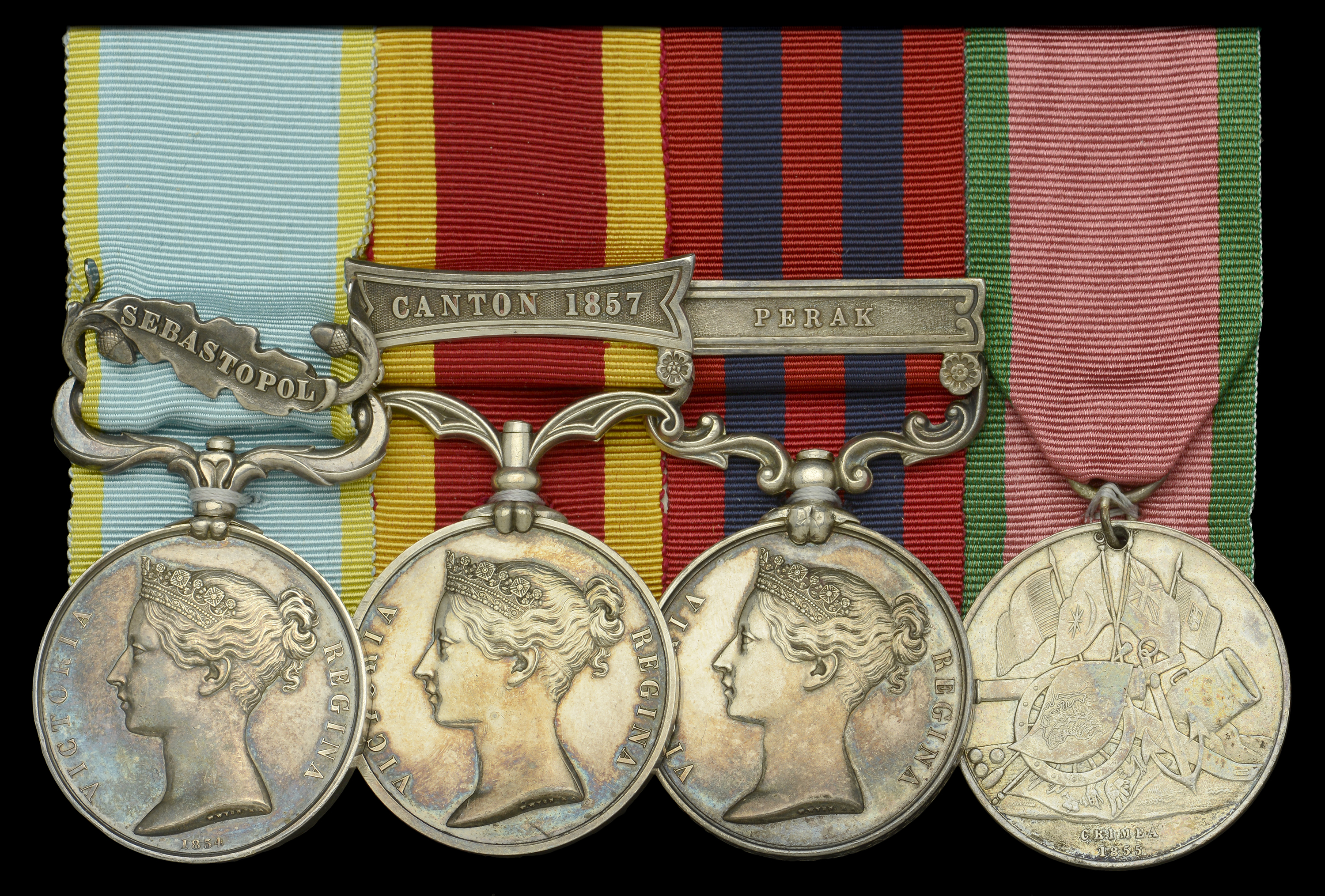The Victorian campaign group of four awarded to Captain F. Stirling, Royal Navy, who was specially promoted for his command of the Naval Brigade landed from H.M. ships Thistle and Fly during the Perak campaign but was later a victim of the ‘Bermuda Triangle’ when his ship was lost with all hands in February 1880 Crimea 1854-56, 1 clasp, Sebastopol, unnamed as issued; China 1857-60, 1 clasp, Canton 1857, unnamed as issued; India General Service 1854-94, 1 clasp, Perak (Commdr. F. Stirling, R.N. H.M.S. “Thistle”); Turkish Crimea 1855, British issue, unnamed as issued, extremely fine (4) £4,000-£5,000 --- Importation Duty This lot is subject to importation duty of 5% on the hammer price unless exported outside the UK --- --- Provenance: Dix Noonan Webb, June 2006. Francis Stirling was born on 1 April 1839, son of Charles Stirling, of Muiravonside House, Linlithgow, West Lothian. Having attended Edinburgh Academy, he entered the Royal Navy as a Naval Cadet in March 1852 and joined Highflyer in May 1853, in which he was appointed Midshipman in March 1854. He subsequently served in that ship in the Crimea, including the bombardment of Sebastopol, 17 October, and the subsequent night attacks. Transferring to the Sans Pareil in June 1856, in which he was appointed Mate, he saw further action in the Second China War 1857-60, when he was landed with the Naval Brigade and participated in the assault, capture, and occupation of Canton. Advanced to Lieutenant in July 1859, he was subsequently present at the loss of the Bombay when she was burnt on 14 December 1864. On that occasion, when everything that could be thought of to save life had been done, Commander Wilson said to him, standing on the forecastle amid falling spars and burning ropes, the flames bursting through the upper deck, and the ship in momentary danger of blowing up, “Now, Stirling, we can do no more; we will jump overboard and swim to the boats.” His answer was calm and firm, “There is no hope for me; I can’t swim.” He was only saved, after great peril and painful suspense, from under the bows of the ship by a volunteer boat’s crew, at the imminent risk for a second time of their own lives. As Commander of Thistle during the Perak campaign of 1875-76, Stirling commanded the 3rd Division of Naval Brigade during operations against the Malays in the Straits of Malacca and defeated the Malays in two attacks at Passir Sala, for which he was specially mentioned for his zeal and energy. He also planned and carried out the attack and capture of Passir Sala, and subsequently commanded the Naval Brigade operating against Sungsi U’Jong, including the capture of the enemy’s stockades in the Buket Putas Pass. For his ‘distinguished service’ in the Malay Peninsula he was specially promoted to Captain on 9 March 1876. Stirling was immediately placed on half-pay whilst awaiting a suitable command which eventually came in September 1878, in the shape of the training ship Atalanta. A sailing frigate, built in 1844, Atalanta was converted into a training ship for ordinary seamen after the tragic loss of the Eurydice in March 1878 with her complement of some 300 men and boys. The Atalanta left Portsmouth on 7 November 1879, having on board 15 officers and 265 men and boys. It was Atalanta’s third voyage in the capacity of a training ship and early in the cruise yellow fever broke out and the Stirling decided to run for Bermuda, where he arrived on 29 January 1880. Two days later the ship sailed for home, having considerably shortened her timetable, and from the date of her leaving Bermuda the Atalanta was never heard of again. A terrific gale raged from the 12th to the 16th of February and it is possible that the vessel was overwhelmed by this. The Channel Squadron under Admiral Hood made an exhaustive search over a wide area but without result, and in May the Admiralty was compelled to conclude that the Atalanta was lost. A Naval Officer, writing after the loss of the Atalanta, said: ‘The noble character of Captain Francis Stirling is alone sufficient reason for speaking of his sad death, apart from the great calamity in which his ship and her living freight are included. I speak with confidence when I say that no officer in the Navy had won more universal affection and respect among those with whom he had served than Francis Stirling ... his calmness in danger will, one may trust, have stood all around him in good stead in their last moments.’ Sold with copied record of service and other research.





